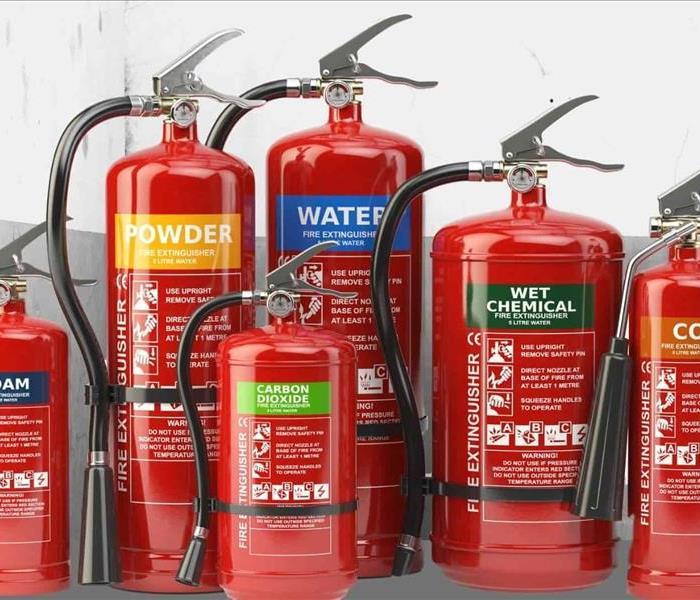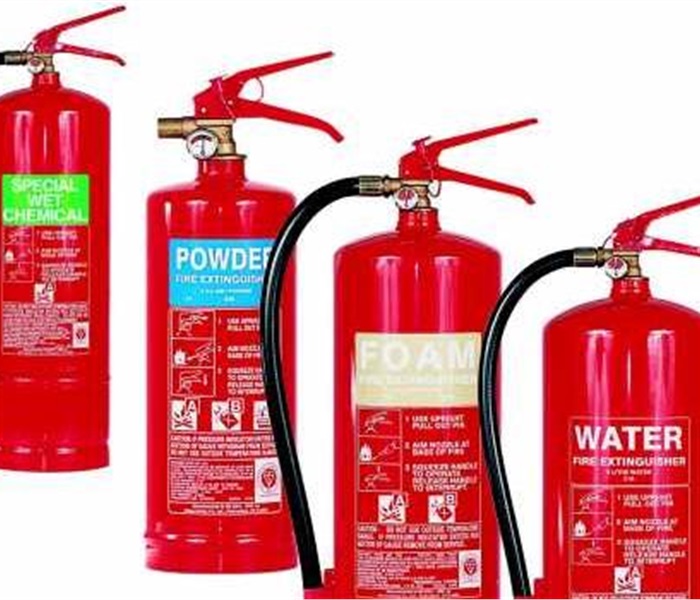Recent Fire Damage Posts
Why Virginia Beach Residents Should Choose SERVPRO™ of Virginia Beach for Fire Restoration
2/14/2024 (Permalink)
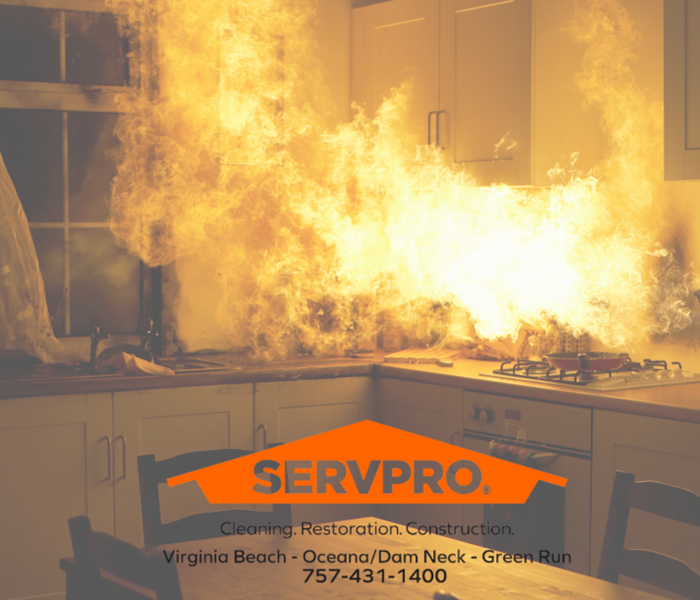 Fire in kitchen
Fire in kitchen
Experiencing a fire in your home is a devastating event that can leave behind not only physical damage but also emotional distress. In such a challenging time, having a reliable and efficient restoration service is crucial to help you get your life back on track. For residents of Virginia Beach, SERVPRO of Virginia Beach stands out as a trusted partner in fire restoration. With their expertise, dedication, and commitment to excellence, they are the go-to choice for restoring homes and peace of mind.
One of the primary reasons why Virginia Beach residents should choose SERVPRO for fire restoration is their unmatched expertise and experience in handling fire damage. With years of experience in the industry, SERVPRO technicians are highly trained and certified to address all aspects of fire damage restoration. From assessing the extent of the damage to implementing effective restoration strategies, they have the knowledge and skills to deliver exceptional results.
Fire damage restoration requires specialized techniques and equipment to ensure thorough and efficient cleanup and restoration. SERVPRO of Virginia Beach utilizes state-of-the-art equipment and advanced restoration techniques to tackle even the most challenging fire damage scenarios. From removing smoke odor to cleaning soot and ash residues, they employ cutting-edge tools and technology to restore your home to its pre-fire condition.
When it comes to fire damage restoration, time is of the essence. That's why SERVPRO of Virginia Beach offers prompt response and 24/7 availability to ensure that help is always just a phone call away. Their team understands the urgency of the situation and works swiftly to mitigate further damage and begin the restoration process immediately. Whether it's day or night, weekends, or holidays, you can count on SERVPRO to be there when you need them the most.
SERVPRO of Virginia Beach provides comprehensive fire damage restoration services tailored to meet the unique needs of each client. From initial assessment and emergency board-up services to debris removal, cleaning, and restoration, they handle every aspect of the restoration process with precision and care. Their comprehensive approach ensures that every detail is addressed, leaving no room for overlooked damage or lingering issues.
Dealing with insurance companies can be overwhelming, especially in the aftermath of a fire. SERVPRO of Virginia Beach simplifies the process by offering assistance with insurance claims. Their team works closely with insurance adjusters to document the damage, provide accurate estimates, and streamline the claims process, allowing you to focus on rebuilding your life while they handle the paperwork.
When it comes to fire damage restoration in Virginia Beach, SERVPRO of Virginia Beach stands out as the premier choice for homeowners in need of reliable and efficient restoration services. With their expertise, advanced techniques, prompt response, and comprehensive approach, they deliver exceptional results that exceed expectations. In the aftermath of a fire, trust SERVPRO to restore your home and peace of mind with professionalism, compassion, and dedication.
Fire Restoration
6/15/2022 (Permalink)
While it’s true that a house fire can be an extremely difficult and overwhelming experience, professional fire restoration companies are available to help you deal with the aftermath. When fire damage is the result of fire in our home—one of the scariest and most devastating events we can face—it can make us feel panicked, vulnerable, and helpless. The good news is that you don’t have to deal with it alone when you have the right fire restoration services to guide you.
What professional fire restoration companies do is a science designed to provide the most effective restoration and resolution after a fire to get your home back to its original condition and get you back to life as you know it.
Here are 3 amazing facts about fire restoration, and #3 just might surprise you:
#1: With a House Fire, Smoke Goes Everywhere
Even if you have a tiny kitchen fire with minimal damage, you will experience the smell of smoke and have the potential for smoke damage throughout other areas of your home, or maybe even throughout your entire home. Smoke travels everywhere. It’s made up of particles of the fuel that burned in the fire combined with chemicals and particulates that become airborne during the fire and then move throughout your house.
Smoke damage restoration is one of the primary concerns during fire restoration. If smoke damage is not treated properly it can cause more and more problems as it sits on surfaces throughout your home. And the odor lingers long after the fire is out and can make a home unlivable if it isn’t dealt with successfully. It takes the proper tools, equipment, products, and know-how to get rid of smoke damage.
#2: Fire Damage Is Often More Extensive (and More Dangerous) than It Looks
When the fire is out and the smoke has cleared, the danger isn’t necessarily over. Fire damage is often more extensive than it first appears. A small fire can damage not just the surface where the fire occurred but can damage the interiors of walls and ceilings and can affect the electrical and the structure of your home in unexpected ways.
When fire burns, the temperature and ferocity often depends on the fuel. In a home fire, that often includes lots of synthetic and petroleum based products like carpet and flooring, toys and furniture, and plastics and artificial laminates. This type of fire creates smoke and soot residue that is greasy and smeary and can be difficult to remove as well as toxic to handle.
When there is a fire against a wall, it can also burn the interior support structure and the floor below. This is another danger you could be facing if you choose to enter the home before it’s deemed safe by the fire department. Use caution when dealing with the interior of your home as well as the residue left behind by the fire. Call in a professional before you do anything.
#3: House Fires Lead to Water, Water Everywhere!
One of the most damaging things about a house fire isn’t necessarily the flames but the water used to extinguish them. Surprised? You’re not alone. Most homeowners expect to find fire damage after a fire, not water damage. The truth is that water can often cause more damage after the fact than the fire itself.
The water, though essential to put out the fire, is used in massive quantities and will run down through your home, pooling in the lowest areas of each floor. Not only can this cause damage to your belongings and the structure of your home, but it can cause an even more dangerous situations.
Fire damage is something we all hope we never have to deal with, but if you should be faced with a fire in your home, it’s important to know what you’re dealing with and why you should put the care of your home in the hands of a restoration company.
Contact SERVPRO for any restoration needs at 757-431-1400.
Choosing The Right Fire Extinguisher
5/3/2022 (Permalink)
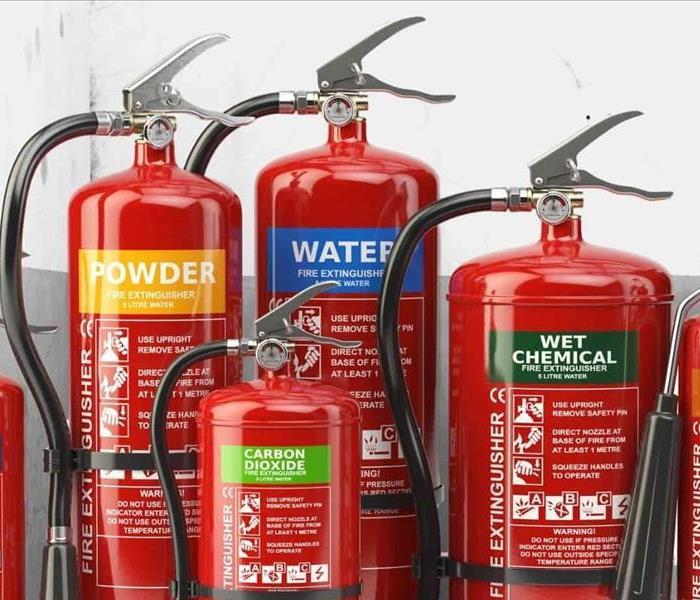 Choosing the right fire extinguisher
Choosing the right fire extinguisher
Here's a tip... Choosing the appropriate Fire Extinguisher
Class A:
This is the most common extinguisher and can be used to put out fires in ordinary combustibles such as cloth, wood, rubber, paper and many plastics.
Class B:
Used on fires involving flammable liquids such as grease, gasoline and oil.
Class C:
Designed for fires involving appliances, tools or other equipment electrically energized or plugged in.
Class D:
For use on flammable metals; often specific for the type of metal in question. These are typically found only in factories working with these metals.
Class K:
Intended for use on fires that involve vegetable oils, animal oils or fats in cooking appliances. These extinguishers are generally found in commercial kitchens, but are becoming more popular in the residential market for use in kitchens.
SERVPRO of Virginia Beach is quietly taking to the streets, every hour of every day, proving that whenever there is a house full of water or an office full of smoke, there is a van full of clean! It's always best to call our office directly! 757-431-1400
Dryer Fire- Don't Be a Victim.
1/7/2022 (Permalink)
An electric or gas clothes dryer is nearly an essential part of life in most homes. In families with children, the laundry can seem a daunting task, going on forever with washing machines and dryers churning and turning away slowly at a never-ending mountain of laundry.
But, all that convenience carries with it the possibility of a deadly hazard -- a dryer fire -- the leading cause of home fires in this country at the rate of about 15,000 every year.
*Don't dry dangerously*
While today's clothes dryer is in itself a safe piece of machinery and a feat of modern technology, it isn't fail-safe and requires regular preventive maintenance to prevent fires that could start in your lint trap or anywhere within your dryer's venting.
When lint traps aren't cleaned as often as they should be, the resulting build-up in the screen or other areas can cause the dryer to perform poorly, operate at elevated temperatures and possibly overheat -- with dangerous consequences. Vent systems must also be checked and cleaned to maintain proper air flow for the same reasons.
Problems may also occur if consumers place improper items in their dryers, such as foam backed rugs or athletic shoes, or vent their appliances with plastic or vinyl exhaust materials. Make sure that whatever you put in your dryer is approved and safe to place in a dryer. When in doubt, check the washing instructions on the tag of the clothing or consult the manufacturers website for more information.
Please follow these useful tips to avoid a dryer fire. In the unfortunate event that you encounter a dryer fire and the damage left in its wake, please call us at SERVPRO of Virginia Beach and we can make it "Like it never even happened."
757-431-1400
It' s always best to call us directly
Five Things To Do After A House Fire
1/4/2022 (Permalink)
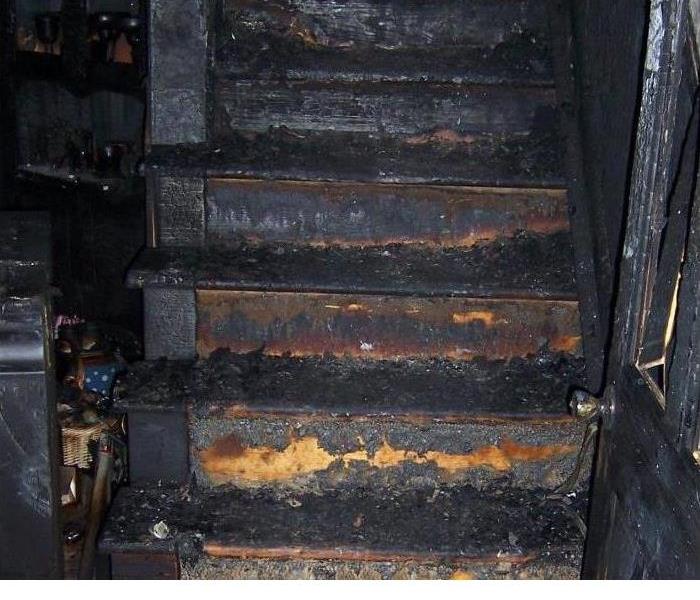 aftermath of a house fire
aftermath of a house fire
A house fire is traumatic event that can certainly leave you with a mix of emotions. You’ll be nervous, worried, scared, upset, wondering what to do next, and just how to do it. First things first…take a deep breath, try to relax, and know that everything will be more than fine. Ultimately you need to make sure that your family is safe and sound. Once you can confirm that, then you can tackle the recovery process of your home and belongings.
We’ve compiled a list of five things that you should do and be aware of after a fire. This way, you can approach the rebuilding of your home in a cool, calm, and collected manner!
(1) Review with the authorities and the professionals as to when it is safe to enter the home after the fire. The fire department will make sure that the fire is completely extinguished and then will go through their precautionary measures in order to deem the area ‘safe’.
(2) Know who to contact. First, contact any family members to let them know of the occurrence and the fact that you are safe. Review, and then contact your insurance company. A clean-up team, such as G.W.Savage, should also be one of the first calls made. We can efficiently and professionally get you back into your home – it will be as if nothing happened!
(3) Get the fire report. Typically coming to you from the fire department, this correspondence will review the facts of the fire – the home structure, the area of the fire, as well as the time and date. In some cities and towns, you may need to call the fire department directly in order to get a copy of this report.
(4) Make sure to secure your property. If you are not securing the property, you could potentially be making a bad situation into a terrible one – your home could be robbed of it’s remaining property, or, in some cases, another individual could be injured on the property (becoming your responsibility). You can ask the authorities and emergency services on the best methods in securing what is yours.
(5) Begin the clean-up process. Interior and exterior clean-up will most certainly be required, and more often than not there is damage that you cannot locate with the naked eye. That said, you should definitely hire a professional service like SERVPRO to do a thorough cleaning of all areas and of all soot, smoke, and odor.
Call us at 757-431-1400
Holiday Fire Safety in Virginia Beach
12/8/2021 (Permalink)
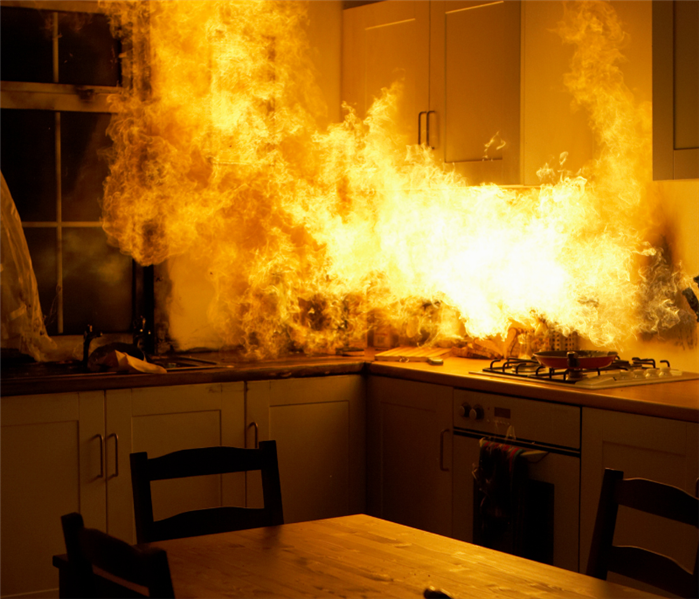 Cooking equipment is the leading cause of residential fires.
Cooking equipment is the leading cause of residential fires.
Cooking equipment is the leading cause of residential fires. During this time of year, you will find that you are using your cooking equipment more often while hosting family and friends, and fire precautions should be top of mind.
You may experience a flood of emotions if a fire damages your home or business. There might be fear, stress, and uncertainty about the future of the property. Here at SERVPRO of Virginia Beach, we have a restore not replace attitude and our number one goal is to get everything back to preloss condition. We strive not only to restore your property, but your piece of mind as well. If you experience a fire, the following tips may help reduce damage and increase chances of a successful restoration.
- Do not attempt to wash any walls or painted services.
- Limit movement in the home to prevent soot particles from being embedded into upholstery and carpet.
- If heat is off during winter, pour RV antifreeze in sinks, toilet bowls and holding tanks and tubs to avoid freezing pipes and fixtures.
- Wipe soot from chrome kitchen and bathroom faucets, trim, and appliances. Then protect these surfaces with a light coating of a lubricant.
- Tape double layers of cheesecloth over air registers to stop particles of soot from getting into the HVAC system.
After the first wave of heroes have secured the building, Call SERVPRO of Virginia Beach professionals and let us help make it “Like it never even happened.” 757-431-1400
Knowing the Class of Your Fire Extinguisher in Virginia Beach
12/8/2021 (Permalink)
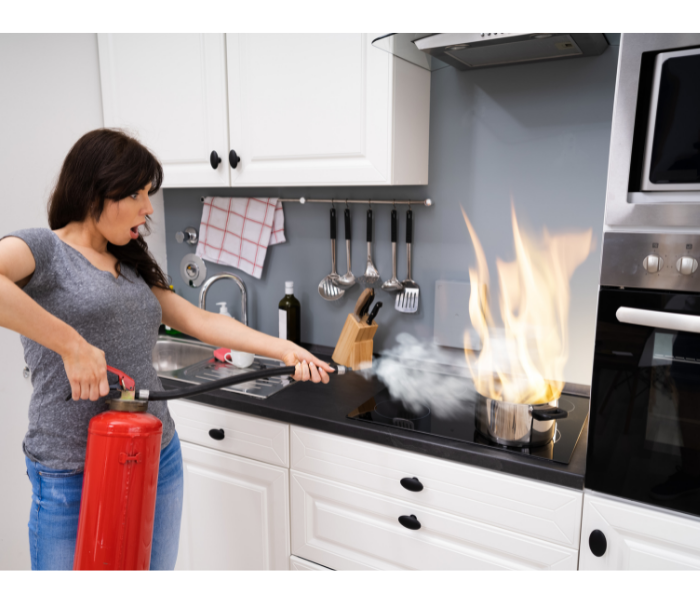 Knowing how to use a fire extinguisher can save your home.
Knowing how to use a fire extinguisher can save your home.
Understanding Fire Extinguisher Classes
There are four classes of fire extinguishers – A, B, C and D – and each class can put out a different type of fire.
- Class A will put out fires in ordinary combustibles such as wood and paper
- Class B are for use on flammable liquids like grease, gasoline, and oil
- Class C are suitable for use only on electrically energized fires
- Class D are designed for use on flammable metals
Multipurpose extinguishers can be used on different types of fires and will be labeled with more than one class, like A-B, B-C or A-B-C.
Purchasing Your Fire Extinguisher
Now that you know how many extinguishers you need and what types to get, you can head to the hardware store. Look for fire extinguishers that you can easily lift. Larger extinguishers may pack more power, but you must be able to use it properly.
Learning How to Use Your Fire Extinguisher
Once you have made your purchases, familiarize yourself with the fire extinguisher directions so you will be prepared in case you need to put out a fire. Typically, fire extinguishers are easy to use in the case of a fire. Most of the types operate using the P.A.S.S. technique:
- P. Pull the pin on the fire extinguisher to break the tamper seal.
- A. Aim the fire extinguisher low, with the nozzle pointed at the base of the fire.
- S. Squeeze the handle of the fire extinguisher to release the extinguishing agent.
- S. Sweep the nozzle from side to side while pointed at the base of the fire until it is extinguished.
- If the fire re-ignites, repeat the last 3 steps.
SERVPRO of Virginia Beach professionals have the training and the equipment to make it "Like it never even happened." Give us a call at 757-431-1400.
Home Fires Are Preventable
12/8/2021 (Permalink)
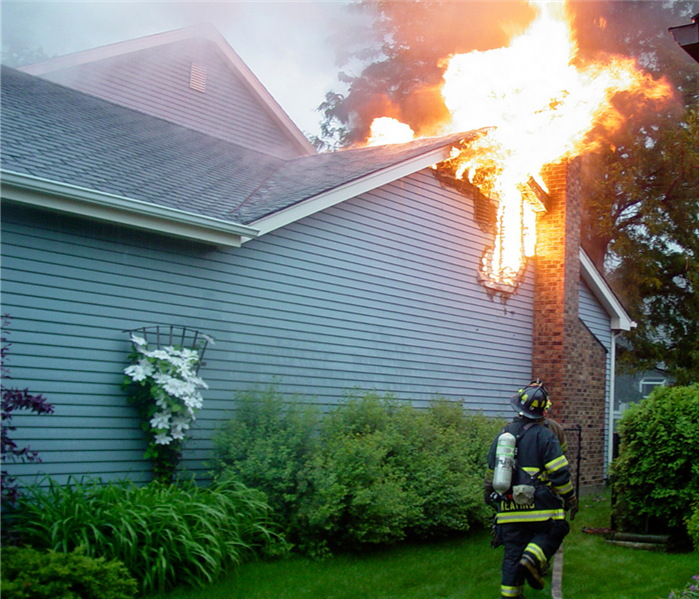 Home fires are preventable
Home fires are preventable
When it comes to your home or business there are certain safety precautions that can be taken to help to prevent fires. Ready.gov has provided the following tips on home fire prevention.
- Frayed wires can cause fires. You should replace all worn, old or damaged appliance cords as soon as possible. Do not run cords under rugs or furniture.
- Immediately shut off then replace light switches that are hot to the touch and all lights that flicker.
- This one seems more obvious, if you have a three-prong plug, use it only in a three-slot outlet. Never force it into a two-slot outlet or an extension cord
- Never leave candles unattended.
If you have a fireplace a woodstove they should be inspected annually. They should also be checked monthly for damage and or obstructions. You should use a fireplace screen heavy enough to stop rolling logs and big enough to cover the entire opening of the fireplace to catch flying sparks.
Make sure the fire is completely out before leaving the house or going to bed.
The professionals at SERVPRO of Virginia Beach have the training and equipment to help make it "Like it never even happened." Give us a call at 757-431-1400.
Choosing the appropriate Fire Extinguisher
6/16/2021 (Permalink)
Here's a tip... Choosing the appropriate Fire Extinguisher
Class A:
This is the most common extinguisher and can be used to put out fires in ordinary combustibles such as cloth, wood, rubber, paper and many plastics.
Class B:
Used on fires involving flammable liquids such as grease, gasoline and oil.
Class C:
Designed for fires involving appliances, tools or other equipment electrically energized or plugged in.
Class D:
For use on flammable metals; often specific for the type of metal in question. These are typically found only in factories working with these metals.
Class K:
Intended for use on fires that involve vegetable oils, animal oils or fats in cooking appliances. These extinguishers are generally found in commercial kitchens, but are becoming more popular in the residential market for use in kitchens.
SERVPRO of Virginia Beach is quietly taking to the streets, every hour of every day, proving that whenever there is a house full of water or an office full of smoke, there is a van full of clean! It's always best to call our office directly! 757-431-1400
Fire restoration
5/6/2021 (Permalink)
While it’s true that a house fire can be an extremely difficult and overwhelming experience, professional fire restoration companies are available to help you deal with the aftermath. When fire damage is the result of fire in our home—one of the scariest and most devastating events we can face—it can make us feel panicked, vulnerable, and helpless. The good news is that you don’t have to deal with it alone when you have the right fire restoration services to guide you.
What professional fire restoration companies do is a science designed to provide the most effective restoration and resolution after a fire to get your home back to its original condition and get you back to life as you know it.
Here are 3 amazing facts about fire restoration, and #3 just might surprise you:
#1: With a House Fire, Smoke Goes Everywhere
Even if you have a tiny kitchen fire with minimal damage, you will experience the smell of smoke and have the potential for smoke damage throughout other areas of your home, or maybe even throughout your entire home. Smoke travels everywhere. It’s made up of particles of the fuel that burned in the fire combined with chemicals and particulates that become airborne during the fire and then move throughout your house.
Smoke damage restoration is one of the primary concerns during fire restoration. If smoke damage is not treated properly it can cause more and more problems as it sits on surfaces throughout your home. And the odor lingers long after the fire is out and can make a home unlivable if it isn’t dealt with successfully. It takes the proper tools, equipment, products, and know-how to get rid of smoke damage.
#2: Fire Damage Is Often More Extensive (and More Dangerous) than It Looks
When the fire is out and the smoke has cleared, the danger isn’t necessarily over. Fire damage is often more extensive than it first appears. A small fire can damage not just the surface where the fire occurred but can damage the interiors of walls and ceilings and can affect the electrical and the structure of your home in unexpected ways.
When fire burns, the temperature and ferocity often depends on the fuel. In a home fire, that often includes lots of synthetic and petroleum based products like carpet and flooring, toys and furniture, and plastics and artificial laminates. This type of fire creates smoke and soot residue that is greasy and smeary and can be difficult to remove as well as toxic to handle.
When there is a fire against a wall, it can also burn the interior support structure and the floor below. This is another danger you could be facing if you choose to enter the home before it’s deemed safe by the fire department. Use caution when dealing with the interior of your home as well as the residue left behind by the fire. Call in a professional before you do anything.
#3: House Fires Lead to Water, Water Everywhere!
One of the most damaging things about a house fire isn’t necessarily the flames but the water used to extinguish them. Surprised? You’re not alone. Most homeowners expect to find fire damage after a fire, not water damage. The truth is that water can often cause more damage after the fact than the fire itself.
The water, though essential to put out the fire, is used in massive quantities and will run down through your home, pooling in the lowest areas of each floor. Not only can this cause damage to your belongings and the structure of your home, but it can cause an even more dangerous situation as it creates the perfect environment for mold growth.
Dealing with mold after a fire is more common than you might think. Mold is damaging to your home and belongings but it can also pose a huge health risk and needs to be dealt with by an experienced professional. This is why the fire restoration process generally includes water damage restoration to ensure a successful and safe repair.
Fire damage is something we all hope we never have to deal with, but if you should be faced with a fire in your home, it’s important to know what you’re dealing with and why you should put the care of your home in the hands of a restoration company.
Contact SERVPRO for any restoration needs at 757-431-1400.
Did you know that SERVPRO of Virginia Beach can restore your documents after a fire?
1/7/2021 (Permalink)
Did you know that SERVPRO of Virginia Beach Can Restore Your Documents After a Fire?
We want our customers taken care of in their most vulnerable time of need, that is why we offer the services that we do: emergency mitigation, fire and water restoration, mold remediation, and so much more. However, one item that often is overlooked after are our customer’s paper documents and records.
If you are not familiar with it, here is an overview.
SERVPRO of Virginia Beach’s Commercial Large Loss Division (CLLD) offers four services: Vacuum Freeze Drying, Gamma Irradiation, Digitizing, and Certified Destruction. Vacuum Freeze Drying is the most effective way to salvage water damaged documents. The saturated documents are immediately frozen and shipped from the loss site to our Corporate office where they are dried via sublimation. Sublimation is the process of solid ice converting directly to the gas state bypassing the liquid state. This prevents further damage to the water-logged documents. This process takes between 7-10 days depending on the severity and the number of documents affected. Gamma Irradiation is a process that is used for cleaning/disinfecting and decontaminating documents. In a CAT 3 situation (sewage or flood water), documents are not only deteriorating but are also contaminated with all types of bacteria. Using high-energy photons, the bacteria is killed at the molecular level. There is no fear of residual radiation or contamination, so don’t worry, you won’t turn into the Incredible Hulk. If you want to go digital with your records, we can do that too.
To bullet point and sum up the above article:
- Drying- process in which an item containing moisture is frozen and dried using vacuums and pressures to achieve sublimation (A process in which a substance is converted directly from a solid to a gas or from a gas to a solid without an intermediate liquid phase.) Note: Damaged documents should be frozen as quickly as possible to stabilize them and prevent further damage.
- Cleaning- we offer onsite cleaning. This is cleaning each document front and back to remove debris and any surface particulate.
- Sterilization- Gamma Irradiation is a process that is used for disinfecting and decontaminating documents or other consumer goods.
- Deodorization- once paper has been wet, an odor can begin to form. Letting us deodorize your documents will reduce the odor and sometimes almost eliminate it.
- Destruction- we offer destruction onsite.
- Digitization- digitizing documents makes them easier to access as well as easier to store. We use state-of-the-art equipment to turn your paper copy into a digital file.
If you find yourself in need of saving damaged documents, SERVPRO of Virginia Beach and we will make it "Like it never even happened."
Home Fires are Preventable in Virginia Beach
12/14/2020 (Permalink)
Home Fires are Preventable in Virginia Beach
When it comes to your home or business there are certain safety precautions that can be taken to help to prevent fires. Ready.gov has provided the following tips on Home fire prevention.
- Frayed wires can cause fires. You should replace all worn, old or damaged appliance cords as soon as possible. Do not run cords under rugs or furniture.
- Immediately shut off then replace light switches that are hot to the touch and all lights that flicker.
- This one seems more obvious, if you have a three-prong plug, use it only in a three-slot outlet. Never force it into a two-slot outlet or an extension cord
- Never leave candles unattended.
If you have a fireplace a woodstove they should be inspected annually. They should also be checked monthly for damage and or obstructions. You should use a fireplace screen heavy enough to stop rolling logs and big enough to cover the entire opening of the fireplace to catch flying sparks.
Make sure the fire is completely out before leaving the house or going to bed.
Knowing the Class of Your Fire Extinguisher in Virginia Beach
12/11/2020 (Permalink)
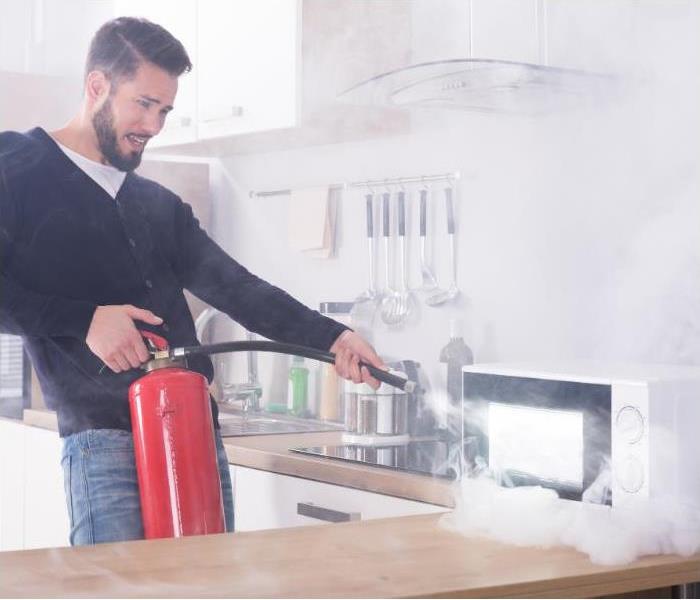 Kitchen fire
Kitchen fire
Understanding fire extinguisher classes
There are four classes of fire extinguishers – A, B, C and D – and each class can put out a different type of fire.
- Class A will put out fires in ordinary combustibles such as wood and paper
- Class B are for use on flammable liquids like grease, gasoline, and oil
- Class C are suitable for use only on electrically energized fires
- Class D are designed for use on flammable metals
Multipurpose extinguishers can be used on different types of fires and will be labeled with more than one class, like A-B, B-C or A-B-C.
Purchasing your fire extinguisher
Now that you know how many extinguishers you need and what types to get, you can head to the hardware store. Look for fire extinguishers that you can easily lift. Larger extinguishers may pack more power, but you must be able to use it properly.
Learning how to use your fire extinguisher
Once you have made your purchases, familiarize yourself with the fire extinguisher directions so you will be prepared in case you need to put out a fire. Typically, fire extinguishers are easy to use in the case of a fire. Most of the types operate using the P.A.S.S. technique:
- P. Pull the pin on the fire extinguisher to break the tamper seal.
- A. Aim the fire extinguisher low, with the nozzle pointed at the base of the fire.
- S. Squeeze the handle of the fire extinguisher to release the extinguishing agent.
- S. Sweep the nozzle from side to side while pointed at the base of the fire until it is extinguished.
- If the fire re-ignites, repeat the last 3 steps.
SERVPRO of Virginia Beach professionals have the training and the equipment to make it “Like it never even happened.”
Holiday fire safety in Virginia Beach
12/10/2020 (Permalink)
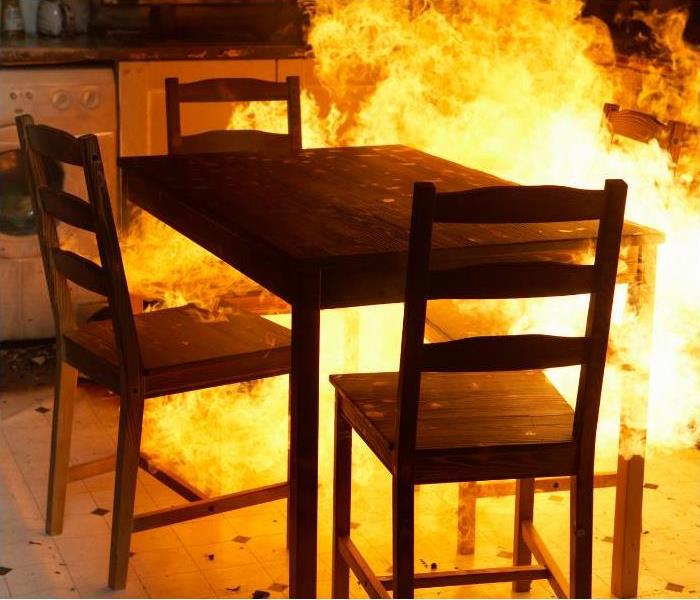 Kitchen fire
Kitchen fire
Cooking equipment is the leading cause of residential fires. During this time of year, you will find that you are using your cooking equipment more often while hosting family and friends, and fire precautions should be on top of the mind.
You may experience a flood of emotions if a fire damages your home or business. There might be fear, stress, and uncertainty about the future of the property. Here at SERVPRO of Virginia Beach, we have a restore not replace attitude and our number one goal is to get everything back to preloss condition. We strive not only to restore your property, but your piece of mind as well. If you experience a fire, the following tips may help reduce damage and increase chances of a successful restoration.
- Do not attempt to wash any walls or painted services.
- Limit movement in the home to prevent soot particles from being embedded into upholstery and carpet.
- If heat is off during winter, pour RV antifreeze in sinks, toilet bowls and holding tanks and tubs to avoid freezing pipes and fixtures.
- Wipe soot from chrome kitchen and bathroom faucets, trim, and appliances. Then protect these surfaces with a light coating of a lubricant.
- Tape double layers of cheesecloth over air registers to stop particles of soot from getting into the HVAC system.
After the first wave of heroes have secured the building, Call SERVPRO of Virginia Beach professionals and let us help make it “Like it never even happened.”
Smoke Alarms Save Lives in Virginia Beach
6/24/2020 (Permalink)
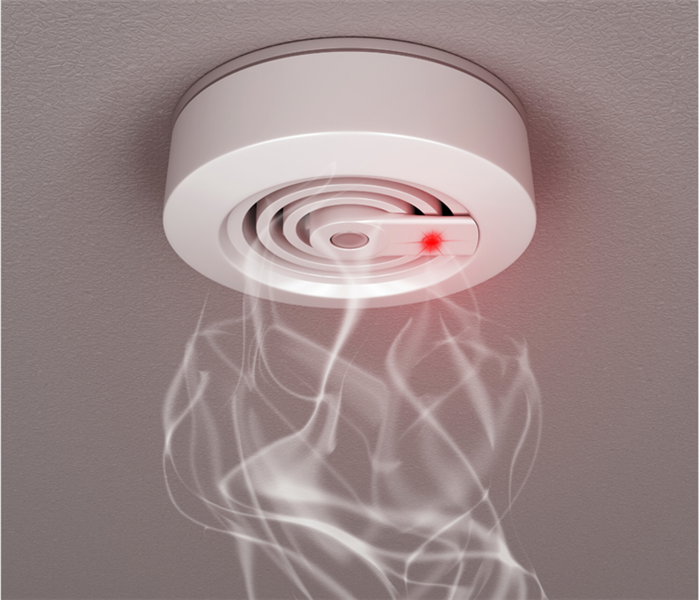 Smoke alarms save lives
Smoke alarms save lives
Smoke alarms save lives when property installed and maintained, according to the National Fire Protection Association (NFPA).
Test smoke alarms monthly using the test button. Smoke alarms with non-replaceable batteries need the entire smoke alarm unit replaced every ten years. If the alarm chirps signaling low battery, take the proper steps to replace the unit or the batteries immediately. Never disable or remove the battery from an alarm. Almost half of first where smoke alarms were present but did not activate had missing or disconnected batteries (NFPA).
In larger commercial facilities, hard wired or wireless smoke alarms offer benefits such as not needing to be tested as often and activating throughout the entire building if smoke is detected in just one area (NFPA).
If you need help installing, testing or changing batteries in your smoke alarms, contact your local fire department, an electrician or the American Red Cross.
Be sure your home or workplace has a fire emergency plan in place and conduct regular fire drills. For more information on Emergency Preparedness, contact SERVPRO of Virginia Beach at 757-431-1400.
Smoke & Soot Facts for Virginia Beach
5/13/2020 (Permalink)
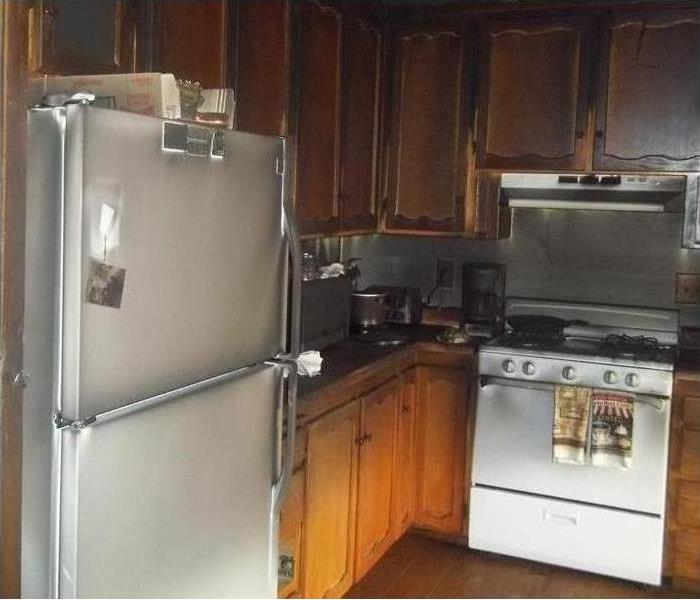 Smoke and soot damage caused by a kitchen fire
Smoke and soot damage caused by a kitchen fire
Smoke and soot from a fire is very invasive and can penetrate various cavities within your home, causing hidden damage and odor. SERVPRO of Virginia Beach’s smoke damage expertise and experience allows us to inspect and accurately assess the extent of the damage to develop a comprehensive plan of action.
Smoke and soot facts:
- Hot smoke migrates to cooler areas and upper levels of a structure
- Smoke flows around plumbing systems, seeping through the holes used by pipes to go from floor to floor
- The type of smoke may greatly affect the restoration process
Different Types of Smoke
There are two different types of smoke–wet and dry. As a result, there are different types of soot residue after a fire. Before restoration begins, SERVPRO of Virginia Beach will test the soot to determine which type of smoke damage occurred. The cleaning procedures will then be based on the information identified during pretesting. Here is some additional information:
Wet Smoke – Plastic and Rubber
- Low heat, smoldering, pungent odor, sticky, smeary. Smoke webs are more difficult to clean
Dry Smoke – Paper and Wood
- Fast burning, high temperatures, heat rises therefore smoke rises
Protein Fire Residue – Produced by evaporation of material rather than from a fire
- Virtually invisible, discolors paints and varnishes, extreme pungent odor
Our Fire Damage Restoration Services
Since each smoke and fire damage situation is a little different, each one requires a unique solution tailored for the specific conditions. The professionals at SERVPRO of Virginia Beach have the equipment, expertise, and experience to restore your fire and smoke damage. We will also treat your family with empathy and respect and your property with care.
Have Questions about Fire, Smoke, or Soot Damage? Call SERVPRO of Virginia Beach at 757-431-1400.
SERVPRO of Virginia Beach can Restore your Documents after any Fire
1/9/2020 (Permalink)
We want our customers taken care of in their most vulnerable time of need, that’s why we offer the services that we do: emergency mitigation, fire and water restoration, mold remediation, and so much more. However, one item that often times are overlooked after are our customer’s paper documents and records.
If you’re not familiar with it, here’s an overview..
SERVPRO of Virginia Beach’s Commercial Large Loss Division (CLLD) offers four services: Vacuum Freeze Drying, Gamma Irradiation, Digitizing, and Certified Destruction. Vacuum Freeze Drying is the most effective way to salvage water damaged documents. The saturated documents are immediately frozen and shipped from the loss site to Corporate where they are dried via sublimation. Sublimation is the process of solid ice converting directly to the gas state bypassing the liquid state. This prevents further damage to the water-logged documents. This process takes between 7-10 days depending on the severity and the number of documents affected. Gamma Irradiation is a process that is used for cleaning/disinfecting and decontaminating documents. In a CAT 3 situation (sewage or flood water), documents are not only deteriorating but are also contaminated with all types of bacteria. Using high-energy photons, the bacteria is killed at the molecular level. There is no fear of residual radiation or contamination, so don’t worry, you won’t turn into the Incredible Hulk. If you want to go digital with your records, we can do that too.
To bullet point and sum up the above article:
- Drying - process in which an item containing moisture is frozen and dried using vacuums and pressures to achieve sublimation(A process in which a substance is converted directly from a solid to a gas or from a gas to a solid without an intermediate liquid phase.) Note: Damaged documents should be frozen as quickly as possible to stabilize them, and prevent further damage.
- Cleaning - we offer onsite cleaning. This is cleaning each document front and back to remove debris and any surface particulate.
- Sterilization - Gamma Irradiation is a process that is used for disinfecting and decontaminating documents or other consumer goods.
- Deodorization - once paper has been wet, an odor can begin to form. Letting us deodorize your documents will reduce the odor and sometimes almost completely eliminate it.
- Destruction - we offer destruction onsite.
- Digitization - digitizing documents makes them easier to access as well as easier to store. We use state-of-the-art equipment to turn your paper copy into a digital file.
If you find yourself in need of saving damaged documents, SERVPRO of Virginia Beach and we will make it "Like it never even happened."
Fire Cleanup
1/2/2020 (Permalink)
The difference between restoring and replacing your property and belongings after a fire depends greatly by how quickly help arrives and mitigation services begin. SERVPRO of Virginia Beach can be onsite within four hours of a fire loss notification. Our professionals provide timely response with mitigation services from fire, smoke and soot removal to content inventory and document restoration. Our services help ensure your property, belongings and memories are restored to preloss condition whenever possible.
Before you risk doing further damage by trying to clean up the damage yourself, call SERVPRO of Virginia Beach at 757-431-1400. We are the fire damage cleanup and restoration professionals and can make it “Like it never even happened."
What Can You Do Until Help Arrives?
- Prevent soot particles from spreading and creating additional damage by limiting movement in the structure
- Put down clean towels and/or linens on high traffic areas
- Put a coat of petroleum jelly or oil on chrome faucets, trim and appliances
- Place aluminum foil under furniture legs to prevent water from carpet wicking into upholstery
SERVPRO of Virginia Beach professionals are available 24-hours a day, 365 days a year to help you regain control.
Keeping House Fires at Bay
1/2/2020 (Permalink)
A sure sign of fire hazard season in Virginia Beach is dropping temperatures and shorter days. While we are all tempted to use our electric blankets and space heaters to stay toasty (it is important to remember to use extra caution when using these items) specifically do not plug them into extension cords or power strips. Space heaters in particular generate a lot of energy with the ability for the heating elements to reach up to 600 degrees so they should only be plugged directly into a wall outlet. When hooked up to a power strip or extension cord the outlet can overheat and potentially catch fire.
The U.S. Consumer Product Safety Commission estimates that more than 25,000 residential fires every year are associated with the use of space heaters, causing 300 deaths.
When buying and installing a small space heater, follow these guidelines:
- Only purchase newer model heaters that have all of the current safety features. Make sure the heater carries the Underwriter's Laboratory (UL) label.
- Choose a thermostatically controlled heater, because they avoid the energy waste of overheating a room.
- Select a heater of the proper size for the room you wish to heat. Most heaters come with a general sizing table.
- Locate the heater on a level surface away from foot traffic. Be especially careful to keep children and pets away from the heater.
- Plug directly into the wall outlet
As always during this time of need, make SERVPRO of Virginia Beach your first call to help you and your local insurance agent assess any damages. We will work for you to restore your property and your life to make it "Like it never even happened."
Do's and Dont's for House Fire
1/2/2020 (Permalink)
What To Do After A Fire
- Limit movement in the home to prevent soot particles from being embedded into upholstery and carpets.
- Keep hands clean so as not to further soil upholstery, walls and woodwork.
- Place clean towels or old linens on rugs, upholstery and carpet traffic areas.
- If electricity is off, empty freezer and refrigerator and prop doors open.
- Clean and protect chrome with light coating of petroleum jelly or oil.
- Wash houseplants on both sides of leaves.
- Change HVAC filter.
- Tape double layers of cheesecloth over air registers.
What NOT To Do After A Fire
- Don't attempt to wash any walls or painted surfaces or shampoo carpet or upholstery without contacting SERVPRO of Virginia Beach.
- Don't attempt to clean any electrical appliances that may have been close to fire, heat or water without consulting an authorized repair service.
- Don't use any canned or packaged food or beverages that may have been stored near the fire, heat or water.
- Don't turn on ceiling fixtures if ceiling is wet. The wiring may be damaged.
- Don't send garments to an ordinary dry cleaner. Improper cleaning may set smoke odor.
Celebrate Safely Virginia Beach
6/25/2019 (Permalink)
 Happy Fourth of July from SERVPRO of Virginia Beach
Happy Fourth of July from SERVPRO of Virginia Beach
The fourth of July is a time to celebrate with friends and family at a barbeque or picnic. With traditions like fireworks and bonfires, there may be some potential dangers along the way. In order to celebrate safely when it comes to these events, consider the following tips provided by the US Fire Administration.
- The best way to enjoy fireworks is to view pubic fireworks displays put on by professionals.
- If you plan to use fireworks, ensure they are legal in your area.
- Always read the directions and warning labels on fireworks. If a device is not marked with the contents, directions and a warning label, do not light it.
- Supervise children around fireworks at all times.
- Stand several feet away from lit fireworks. If a firework does not go off, do not stand over it to investigate. Pour water over it and dispose of it.
More July Fourth Safety Tips:
- Never light fireworks indoors or near dry grass.
- Keep a bucket of water and/or fire extinguisher nearby. Know how to operate the fire extinguisher properly.
- Do not wear loose clothing while cooking at a barbeque.
- Use caution when using lighter fluid on a barbeque. Do not add fluid to an already lit fire, as the flame can flashback into the container and explode.
- Never grill in an enclosed area, as carbon monoxide could be produced.
Sources: SERVPRO Restoration Newsline, Volume 30, Issue 7; National Fire Protection Association
Virginia Beach Smoke and Soot Facts
5/13/2019 (Permalink)
 Smoke and soot damage from a kitchen fire
Smoke and soot damage from a kitchen fire
Smoke and soot from a fire is very invasive and can penetrate various cavities within your home, causing hidden damage and odor. SERVPRO of Virginia Beach’s smoke damage expertise and experience allows us to inspect and accurately assess the extent of the damage to develop a comprehensive plan of action.
Smoke and soot facts:
- Hot smoke migrates to cooler areas and upper levels of a structure
- Smoke flows around plumbing systems, seeping through the holes used by pipes to go from floor to floor
- The type of smoke may greatly affect the restoration process
Different Types of Smoke
There are two different types of smoke–wet and dry. As a result, there are different types of soot residue after a fire. Before restoration begins, SERVPRO of Virginia Beach will test the soot to determine which type of smoke damage occurred. The cleaning procedures will then be based on the information identified during pretesting. Here is some additional information:
Wet Smoke – Plastic and Rubber
- Low heat, smoldering, pungent odor, sticky, smeary. Smoke webs are more difficult to clean
Dry Smoke – Paper and Wood
- Fast burning, high temperatures, heat rises therefore smoke rises
Protein Fire Residue – Produced by evaporation of material rather than from a fire
- Virtually invisible, discolors paints and varnishes, extreme pungent odor
Our Fire Damage Restoration Services
Since each smoke and fire damage situation is a little different, each one requires a unique solution tailored for the specific conditions. The professionals at SERVPRO of Virginia Beach have the equipment, expertise, and experience to restore your fire and smoke damage. We will also treat your family with empathy and respect and your property with care.
Have Questions about Fire, Smoke, or Soot Damage? Call SERVPRO of Virginia Beach at 757-431-1400.
Staying Safe in the Summer
7/2/2018 (Permalink)
Each summer, families and friends across the country enjoy the summer months with barbecues, camping trips, or by cooling off in a pool or lake. In order to enjoy these occasions, it is important to keep safety top of mind to ensure you have fun in the sun.
According to the United States Fire administration, just under 8,600 Americans are injured by fireworks and almost 5,000 are injured by charcoal/wood burning and propane grill fires, annually. A barbecue grill should always be supervised when in use. Keep children and pets a safe distance from the grilling area to prevent accidental burns or tipping off the grill.
If you enjoy lounging by the pool or going for a boat ride to cool off from the summer sun, make sure you exercise caution, especially when children are present. Only swim in approved areas and supervise children at all times when near the water.
Summertime should be a time to make memories and enjoy the great outdoors. The following tips, provided by the National Fire Protection Association (NFPA), will help keep you safe all summer long.
- When using a charcoal grill, only use starter fluid designed for barbecue grills; do not add fluid after coals have been lit.
- When using a gas grill, ensure the hose connection is tight; check hoses for leaks. Applying soapy water to the hoses will easily and safely reveal any leaks.
- Always wear a U.S. Coast Guard-approved PFD (personal floatation device) when boating, jet-skiing, tubing or water-skiing. Air-filled swimming aids, like water wings or inner tubes, are not substitutes for approved PFDs. An adult should always supervise children using these devices.
- Be sure to extinguish all smoking materials and shut down motors and heating devices before fueling a boat. In case of a spill, wipe up fuel and check for fuel leakage and odors.
- When camping, always use a flame retardant tent and setup camp far away from the campfire. Only use flashlights or battery-powered lanterns inside the tent, not liquid-filled heaters or lanterns.
- Always build a campfire down wind from the tent area. Clear vegetation and dig a pit before building your campfire. Always extinguish the fire before going to sleep or leaving the campsite. To extinguish, cover with dirt or pour water over the fire.
- Store liquid fire starter (not gasoline) away from your tent and campfire and only use dry kindling to freshen a campfire.
- Consider leaving firework use to trained professionals. Stay back at least 500 feet from professional fireworks displays.
SERVPRO of Virginia Beach wishes you a safe and happy summer!
Virginia Beach Smoke & Soot
5/21/2018 (Permalink)
Smoke and soot is very invasive and can penetrate various cavities within your home, causing hidden damage and odor. Our smoke damage expertise and experience allows us to inspect and accurately assess the extent of the damage to develop a comprehensive plan of action.
Smoke and soot facts:
- Hot smoke migrates to cooler areas and upper levels of a structure.
- Smoke flows around plumbing systems, seeping through the holes used by pipes to go from floor to floor.
- The type of smoke may greatly affect the restoration process.
Different Types of Smoke
There are two different types of smoke–wet and dry. As a result, there are different types of soot residue after a fire. Before restoration begins, SERVPRO of Virginia Beach will test the soot to determine which type of smoke damage occurred. The cleaning procedures will then be based on the information identified during pretesting. Here is some additional information:
Wet Smoke – Plastic and Rubber
- Low heat, smoldering, pungent odor, sticky, smeary. Smoke webs are more difficult to clean.
Dry Smoke – Paper and Wood
- Fast burning, high temperatures, heat rises therefore smoke rises.
Protein Fire Residue – Produced by evaporation of material rather than from a fire
- Virtually invisible, discolors paints and varnishes, extreme pungent odor.
Our Fire Damage Restoration Services
Since each smoke and fire damage situation is a little different, each one requires a unique solution tailored for the specific conditions. We have the equipment, expertise, and experience to restore your fire and smoke damage. We will also treat your family with empathy and respect and your property with care.
Have Questions about Fire, Smoke, or Soot Damage?
Call Us Today – 757-716-8785
Steps to Take After a House Fire
12/6/2017 (Permalink)
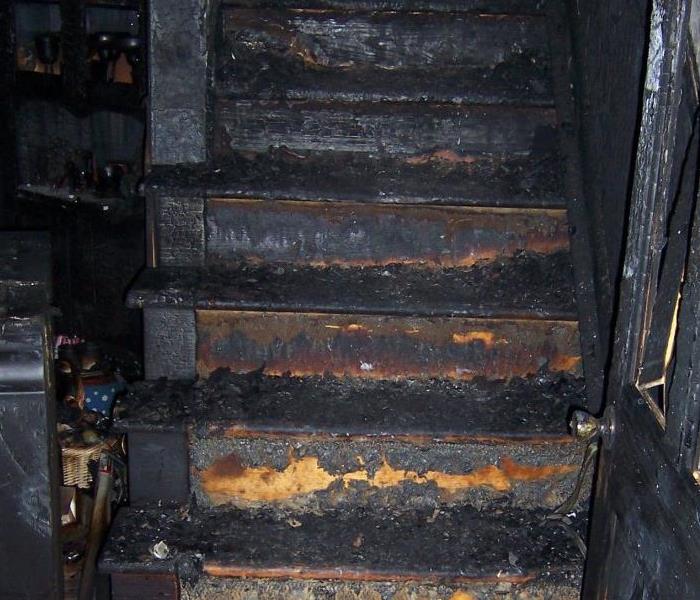 Fire Damage
Fire Damage
A house fire is traumatic event that can certainly leave you with a mix of emotions. You’ll be nervous, worried, scared, upset, wondering what to do next, and just how to do it. First things first…take a deep breath, try to relax, and know that everything will be more than fine. Ultimately you need to make sure that your family is safe and sound. Once you can confirm that, then you can tackle the recovery process of your home and belongings.
We’ve compiled a list of five things that you should do and be aware of after a fire. This way, you can approach the rebuilding of your home in a cool, calm, and collected manner!
(1) Review with the authorities and the professionals as to when it is safe to enter the home after the fire. The fire department will make sure that the fire is completely extinguished and then will go through their precautionary measures in order to deem the area ‘safe’.
(2) Know who to contact. First, contact any family members to let them know of the occurrence and the fact that you are safe. Review, and then contact your insurance company. A clean-up team, such as G.W.Savage, should also be one of the first calls made. We can efficiently and professionally get you back into your home – it will be as if nothing happened!
(3) Get the fire report. Typically coming to you from the fire department, this correspondence will review the facts of the fire – the home structure, the area of the fire, as well as the time and date. In some cities and towns, you may need to call the fire department directly in order to get a copy of this report.
(4) Make sure to secure your property. If you are not securing the property, you could potentially be making a bad situation into a terrible one – your home could be robbed of it’s remaining property, or, in some cases, another individual could be injured on the property (becoming your responsibility). You can ask the authorities and emergency services on the best methods in securing what is yours.
(5) Begin the clean-up process. Interior and exterior clean-up will most certainly be required, and more often than not there is damage that you cannot locate with the naked eye. That said, you should definitely hire a professional service like SERVPRO to do a thorough cleaning of all areas and of all soot, smoke, and odor.
Call us at 757-431-1400
Facts About Fire Restoration
12/4/2017 (Permalink)
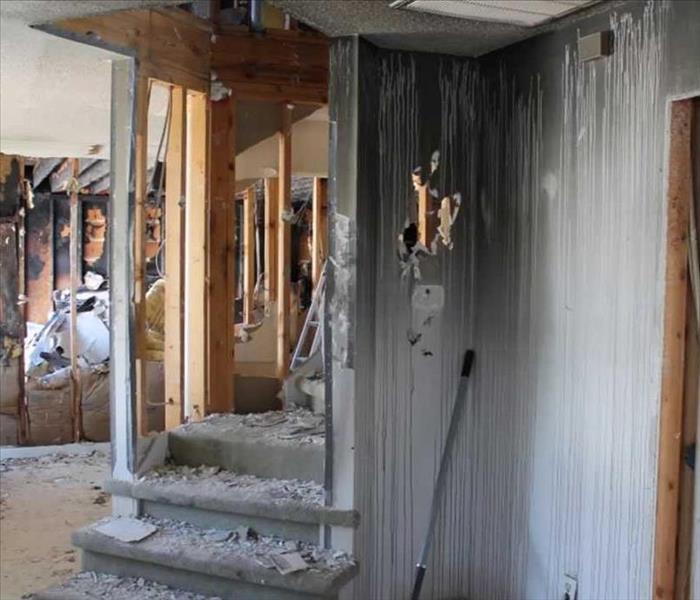 Fire Damage
Fire Damage
While it’s true that a house fire can be an extremely difficult and overwhelming experience, professional fire restoration companies are available to help you deal with the aftermath. When fire damage is the result of fire in our home—one of the scariest and most devastating events we can face—it can make us feel panicked, vulnerable, and helpless. The good news is that you don’t have to deal with it alone when you have the right fire restoration services to guide you.
What professional fire restoration companies do is a science designed to provide the most effective restoration and resolution after a fire to get your home back to its original condition and get you back to life as you know it.
Here are 3 amazing facts about fire restoration, and #3 just might surprise you:
#1: With a House Fire, Smoke Goes Everywhere
Even if you have a tiny kitchen fire with minimal damage, you will experience the smell of smoke and have the potential for smoke damage throughout other areas of your home, or maybe even throughout your entire home. Smoke travels everywhere. It’s made up of particles of the fuel that burned in the fire combined with chemicals and particulates that become airborne during the fire and then move throughout your house.
Smoke damage restoration is one of the primary concerns during fire restoration. If smoke damage is not treated properly it can cause more and more problems as it sits on surfaces throughout your home. And the odor lingers long after the fire is out and can make a home unlivable if it isn’t dealt with successfully. It takes the proper tools, equipment, products, and know-how to get rid of smoke damage.
#2: Fire Damage Is Often More Extensive (and More Dangerous) than It Looks
When the fire is out and the smoke has cleared, the danger isn’t necessarily over. Fire damage is often more extensive than it first appears. A small fire can damage not just the surface where the fire occurred but can damage the interiors of walls and ceilings and can affect the electrical and the structure of your home in unexpected ways.
When fire burns, the temperature and ferocity often depends on the fuel. In a home fire, that often includes lots of synthetic and petroleum based products like carpet and flooring, toys and furniture, and plastics and artificial laminates. This type of fire creates smoke and soot residue that is greasy and smeary and can be difficult to remove as well as toxic to handle.
When there is a fire against a wall, it can also burn the interior support structure and the floor below. This is another danger you could be facing if you choose to enter the home before it’s deemed safe by the fire department. Use caution when dealing with the interior of your home as well as the residue left behind by the fire. Call in a professional before you do anything.
#3: House Fires Lead to Water, Water Everywhere!
One of the most damaging things about a house fire isn’t necessarily the flames but the water used to extinguish them. Surprised? You’re not alone. Most homeowners expect to find fire damage after a fire, not water damage. The truth is that water can often cause more damage after the fact than the fire itself.
The water, though essential to put out the fire, is used in massive quantities and will run down through your home, pooling in the lowest areas of each floor. Not only can this cause damage to your belongings and the structure of your home, but it can cause an even more dangerous situation as it creates the perfect environment for mold growth.
Dealing with mold after a fire is more common than you might think. Mold is damaging to your home and belongings but it can also pose a huge health risk and needs to be dealt with by an experienced professional. This is why the fire restoration process generally includes water damage restoration to ensure a successful and safe repair.
Fire damage is something we all hope we never have to deal with, but if you should be faced with a fire in your home, it’s important to know what you’re dealing with and why you should put the care of your home in the hands of a restoration company.
Contact SERVPRO for any restoration needs at 757-431-1400.
Know The Facts About Business Fire Restoration
12/4/2017 (Permalink)
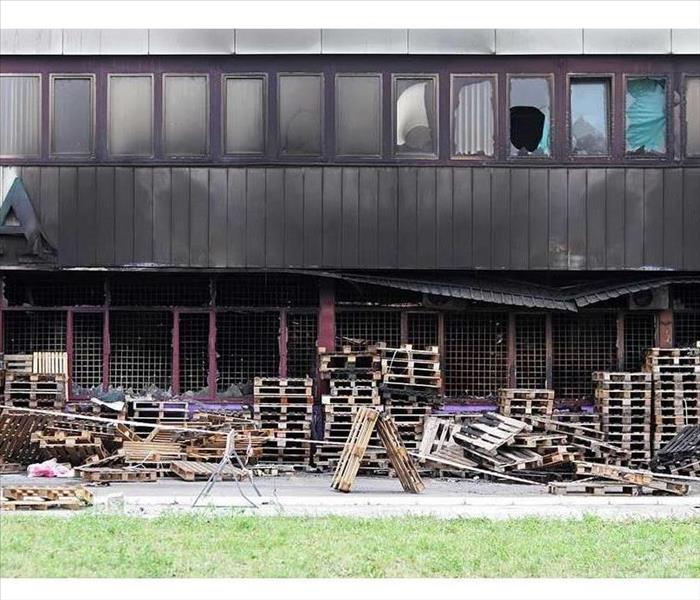 Commercial restoration
Commercial restoration
Know the Facts about Business Fires
According to the U.S. Small Business Administration, as many as one in four businesses that suffer some kind of major disaster do not reopen afterward. It’s true, overcoming a major loss is extremely difficult, but with the right restoration company and team on your side, working hand-in-hand with your insurance company, the chance of your Indianapolis-area company surviving is pretty high!
Depending on the size of the fire, and the amount of damage, some businesses that have come to SERVPRO for help have reopened just days after the fire happened. Thanks to innovations in smoke odor removal, fire damage restoration, and cleaning in general, it is possible for crews to start work nearly immediately after the fire department clears the scene, and have things back up and running in no time. Although, again, that all depends on the severity of the fire. But no matter the severity, recovery is possible!
According to the National Fire Prevention Association, U.S. fire departments responded to about 3,300 office property fires per year between 2007 and 2011. Those fires resulted in about $112 million in property damage each year, and most were in business offices – and happened during business hours. However, the good news is the number of business fires was down a whopping 71 percent from 1980 to 2011.
Here are some other stats from the NFPA:
Time of Day
- Peak time of day for office fires: Noon – 2p.m. (a.k.a. lunch time!)
- 69% happened between 7 a.m. and 7 p.m.
- The 31% that occurred between 7 p.m. and 7 a.m. caused 67% of recorded property damage, because they went undetected longer. This also highlights the need for automatic detection equipment and working sprinkler systems.
- 19% of fires happened on weekends.
Cause of the Business Fires
- 29% were caused by cooking equipment. However, just 6% of these fires caused actual property damage.
- Intentionally-set fires caused the most direct property damage – 21%.
- Electrical equipment is the second leading cause of office fires.
- Just 2% of office fires start in a concealed space like an attic, in the ceiling, or in another conceals space. However, these fires accounted for 13% of the direct property damage.
Containment & Putting it Out
- 4 out of 5 fires were confined to the room of origin.
- 90% of fires were large enough to activate sprinklers, which were effective 88% of the time.
- Deaths per 1,000 stores were 62% lower in offices equipped with sprinklers compared to those without.
Industrial/Manufacturing Facility Fires
The NFPA also has statistics specific to manufacturing facilities. According to their research, there are about 37,000 fires at industrial or manufacturing facilities each year, resulting in 18 deaths, 279 injuries, and $1 billion in property damage. Heating equipment and stop tools were the leading cause – sparking 28 percent of the fires. Mechanical failure or malfunction caused 24 percent of the fires.
Planning for the Worst
As part of your emergency preparation plan, be sure to have a local, reputable restoration company – like SERVPRO– on speed dial. The sooner you get the professionals in cleaning up after the disaster, the sooner you can get back to business 757-431-1400.
Winter Heating Hazards
11/29/2017 (Permalink)
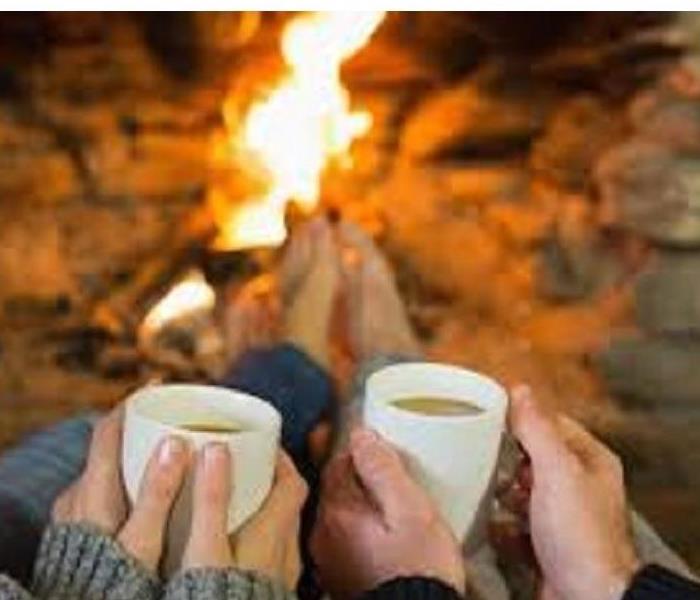 Fire Place
Fire Place
Winter is the same anywhere you go...lower temperatures & shorter days. Often times we use alternative heat sources like fireplaces, portable space heaters, and wood burning stoves to make our homes cozy. Did you know that heating equipment is a leading cause of home fire deaths?
Keep the following safety tips in mind to help reduce your risk of a heating-related fire:
- Keep anything flammable at least three feet away from heating equipment, like the furnace, fireplace, wood stove, or a portable space heater. Have a three foot "kid-free zone around open fires and space heaters.
- Make sure the fireplace has a sturdy screen to stop sparks from flying into the room. Ashes should be cool before putting them in a metal container. Keep the container a safe distance away from your home.
- Remember to turn portable heaters off when leaving the room or going to bed.
- Always use the right kind of fuel, specified by the manufacturer, for fuel burning space heaters.
- Have heating equipment and chimneys cleaned and inspected every year by a qualified professional.
- Have a qualified professional install stationary space heating equipment, water heaters or central heating equipment according to the local codes and manufacturer's instructions.
- Test smoke alarms monthly.
10 Important Fire Damage Facts
11/8/2017 (Permalink)
 House on Fire
House on Fire
While flames can cause the most visible damage to your property during a fire, smoke and soot are silent and sometimes invisible hazards that could cost lives. Water is also a reason for damage after a fire. Even firefighters themselves may cause some damage before they can completely put out a fire. Here are 10 important things to know about fires.
1. In a fire, more people die from inhaling smoke than from the flames. Never think that if you avoid the flames you are safe. Always keep away from smoke.
2. Soot is a coating of fine, black dust created when wood, coal, or oil-based substances are burned. These carbon particles float into the air and settle anywhere. Inhaling soot can caused severe lung deficiencies or even death.
3. If soot contaminates items in your home or business, a fire restoration service provider like SERVPRO must assess the damage to see if restoration is possible.
Need Fire Restoration Advice Or Services? Call SERVPRO Of Virginia Beach At 757-431-1400
4. The worst possible effect of soot is its tendency to cause cancer and cause serious defects in newborns. Soot produces poly cyclic aromatic hydrocarbons. These hydrocarbons are responsible for gene mutation for particular groups of genes. They can cause birth defects and increase the chances of getting cancer.
Water’s Good And Bad
5. Water’s great at putting out most fires but the water itself can cause great damage. You must make sure, after the fire is out, that your home or business is completely dried.
6. Mold colonies can begin to grow just 48 hours after water damage occurs. The combination of fire, water, and mold damage to your commercial property or home could result in a complete loss if not handled properly. See our posts about mold, mold myths, and how to clean up mold.
7. Use caution if you decide to do some of the cleanup after a fire. Never start your cleaning process until you’re properly attired. Wear heavy-duty gloves, safety goggles, and a face mask. Carefully cover your nose and make sure your safety glasses have no place for dust or soot to get into your eyes.
Why Firefighters Break Windows And Cut Holes In Roofs
8. Firefighters are true heroes. However, they often must break windows and cut holes in the roof of buildings on fire. As a fire burns, the fire moves up and down and across, growing very fast. Firefighters break windows and cut holes in roofs to provide ventilation that slows the fire’s growth. Ventilation also helps get rid of dark smoke that makes it hard for firefighters to see where they’re going. The holes and broken windows help firefighters fight the fire more quickly. The bottom line is that breaking windows and cutting holes in roofs help save lives and property.
9. Firefighters will also cut holes in walls at times. That’s not about ventilation. It’s done so the fire department is sure that the fire is completely out. Fire departments don’t want to risk leaving a fire that’s not visible but is still active inside the walls or in other hidden places.
10. If you have a fire, get a copy of the fire report. In most areas, a fire report is a public document. Ask for it at the fire department or fire marshal’s office. The fire report will help you with information that your insurance company and other official offices may request.
For more, see After The Fire: Returning to Normal from FEMA.
Here To Help
The team at SERVPRO of Virginia Beach has specialized training and experience in fire restoration services and natural disaster cleanup.
Call SERVPRO of Virginia Beach 757-431-1400 anytime, 24/7.
Staying Safe in the Summer
6/9/2017 (Permalink)
Each summer, families and friends across the country enjoy the summer months with barbecues, camping trips, or by cooling off in a pool or lake. In order to enjoy these occasions, it is important to keep safety top of mind to ensure you have fun in the sun.
According to the United States Fire administration, just under 8,600 Americans are injured by fireworks and almost 5,000 are injured by charcoal/wood burning and propane grill fires, annually. A barbecue grill should always be supervised when in use. Keep children and pets a safe distance from the grilling area to prevent accidental burns or tipping off the grill.
If you enjoy lounging by the pool or going for a boat ride to cool off from the summer sun, make sure you exercise caution, especially when children are present. Only swim in approved areas and supervise children at all times when near the water.
Summertime should be a time to make memories and enjoy the great outdoors. The following tips, provided by the National Fire Protection Association (NFPA), will help keep you safe all summer long.
- When using a charcoal grill, only use starter fluid designed for barbecue grills; do not add fluid after coals have been lit.
- When using a gas grill, ensure the hose connection is tight; check hoses for leaks. Applying soapy water to the hoses will easily and safely reveal any leaks.
- Always wear a U.S. Coast Guard-approved PFD (personal floatation device) when boating, jet-skiing, tubing or water-skiing. Air-filled swimming aids, like water wings or inner tubes, are not substitutes for approved PFDs. An adult should always supervise children using these devices.
- Be sure to extinguish all smoking materials and shut down motors and heating devices before fueling a boat. In case of a spill, wipe up fuel and check for fuel leakage and odors.
- When camping, always use a flame retardant tent and setup camp far away from the campfire. Only use flashlights or battery-powered lanterns inside the tent, not liquid-filled heaters or lanterns.
- Always build a campfire down wind from the tent area. Clear vegetation and dig a pit before building your campfire. Always extinguish the fire before going to sleep or leaving the campsite. To extinguish, cover with dirt or pour water over the fire.
- Store liquid fire starter (not gasoline) away from your tent and campfire and only use dry kindling to freshen a campfire.
- Consider leaving firework use to trained professionals. Stay back at least 500 feet from professional fireworks displays.
Your local SERVPRO Franchise wishes you a safe and happy summer!
Emergency Fire Damage Do's & Don'ts
5/2/2017 (Permalink)
These tips will assist you in taking proper actions until we arrive to a scene of a fire. Follow these DOs and DON'Ts to help reduce damage and increase the chances of a successful restoration:
DO:
- Limit movement in the home to prevent soot particles from being embedded into carpet and avoid tracking
- Keep hands clean. Soot on hands can further soil upholstery, walls and woodwork
- If electricity is off, empty freezer and refrigerator completely and prop doors open to help prevent odor
- Wipe soot from metal kitchen and bathroom faucets, trim, and appliances.
- If heat is off during winter, pour RV antifreeze in sinks, toilet bowls, holding tanks, and tubs to avoid freezing pipes and fixtures
- Tape double layers of cheesecloth over air registers to stop particles of soot from getting in or out of the HVAC system
DON'T:
- Don't attempt to wash any walls or painted surfaces without contacting SERVPRO first
- Don't attempt to clean any electrical appliances that may have been close to fire, heat, or water without first consulting an authorized repair service
- Don't turn on ceiling fixtures if ceiling is wet. Wiring may be wet or damaged and cause electrical shock, and air movement may create secondary damage
Virginia Beach Smoke & Soot Cleanup
8/24/2016 (Permalink)
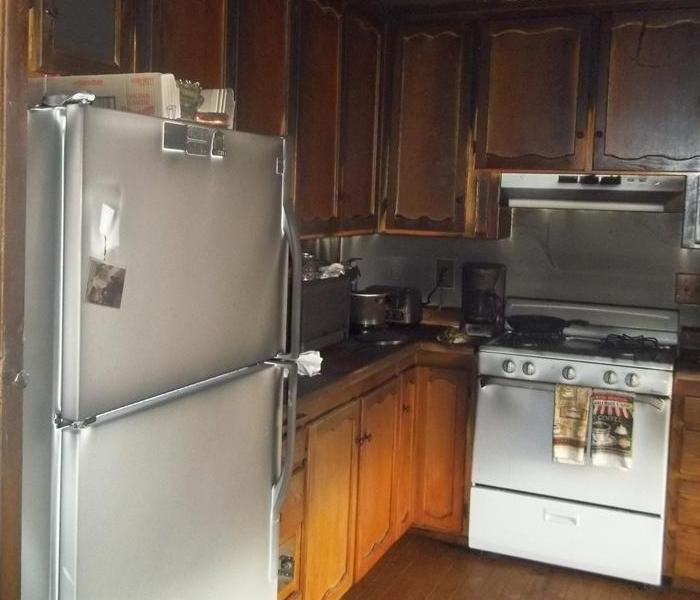 Smoke and soot damage can cause a pervasive odor in your Virginia Beach home.
Smoke and soot damage can cause a pervasive odor in your Virginia Beach home.
Smoke and soot is very invasive and can penetrate various cavities within your home, causing hidden damage and odor. Our smoke damage expertise and experience allows us to inspect and accurately assess the extent of the damage to develop a comprehensive plan of action.
Smoke and soot facts:
- Hot smoke migrates to cooler areas and upper levels of a structure.
- Smoke flows around plumbing systems, seeping through the holes used by pipes to go from floor to floor.
- The type of smoke may greatly affect the restoration process.
Different Types of Smoke
There are two different types of smoke–wet and dry. As a result, there are different types of soot residue after a fire. Before restoration begins, SERVPRO of Virginia Beach will test the soot to determine which type of smoke damage occurred. The cleaning procedures will then be based on the information identified during pretesting. Here is some additional information:
Wet Smoke – Plastic and Rubber
- Low heat, smoldering, pungent odor, sticky, smeary. Smoke webs are more difficult to clean.
Dry Smoke – Paper and Wood
- Fast burning, high temperatures, heat rises therefore smoke rises.
Protein Fire Residue – Produced by evaporation of material rather than from a fire
- Virtually invisible, discolors paints and varnishes, extreme pungent odor.
Our Fire Damage Restoration Services
Since each smoke and fire damage situation is a little different, each one requires a unique solution tailored for the specific conditions. We have the equipment, expertise, and experience to restore your fire and smoke damage. We will also treat your family with empathy and respect and your property with care.
Have Questions about Fire, Smoke, or Soot Damage?
Call Us Today – 757-431-1400
Plan two escapes
4/29/2013 (Permalink)
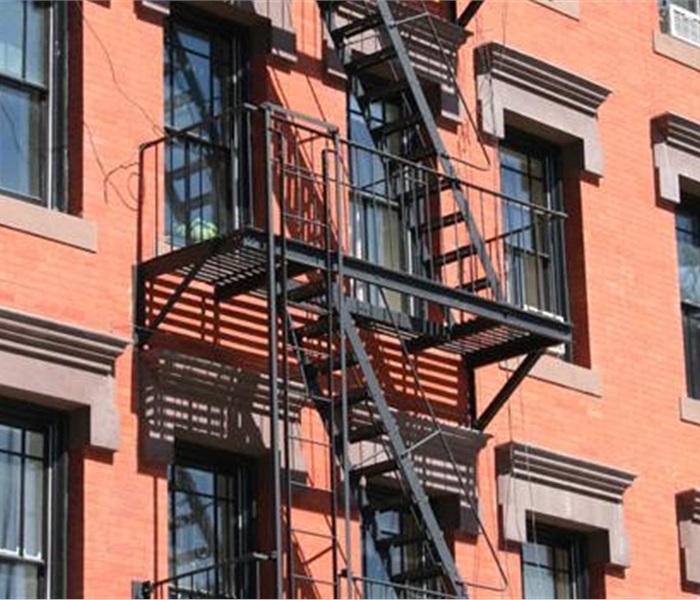
One home structure fire was reported every 85 seconds in 2010.
Most fatal fires kill one or two people. In 2010, 19 home fires killed five or more people. These 19 fires resulted in 101 deaths.
In 2010, U.S. fire departments responded to 369,500 home structure fires. These fires caused 13,350 civilian injuries, 2,640 civilian deaths, and $6.9 billion in direct damage.
As scary as those scenarios look in black and white, imagine just how frightening they are in technicolor.
Though some fires are unavoidable acts of nature or unpredictable accidents, many fires in the home and workplace are avoidable. The following tips, courtesy of the National Fire Protection Association, can help reduce the likelihood of a fire in your business or home.
Watch your cooking. Stay in the kitchen if you are frying, grilling, or broiling food.
Give space heaters space. Keep space heaters at least three feet from anything that can burn.
Smoke outside. If you must smoke inside, have a sturdy, deep ashtray. Never smoke in bed.
Keep matches and lighters out of reach in high cabinets, preferably under a child lock.
Inspect electrical cords. Replace cords that are cracked, damaged, have broken plugs or have loose connections.
Be careful when using candles. Keep candles at least one foot from anything that can burn. Blow them out before you leave the room or go to sleep.
Have a fire escape plan. Make a fire escape plan and practice it at least twice a year. Also, as is this year's theme for fire prevention week -- MAKE SURE YOU HAVE TWO ESCAPE ROUTES.
Install smoke alarms on every level of your office or home and inside bedrooms. Interconnect them so they all sound at once.
Test smoke alarms. Test alarms once per month. Replace batteries once per year or as needed.
Install sprinklers. Sprinklers can help maintain and sometimes even extinguish fires, giving your local Fire Department a better chance of saving your property.
*Fire Prevention Week*
It is important to have a home and office fire escape plan that prepares your family or staff to think fast and get out quickly when the smoke alarm sounds. What if your first escape route is blocked by smoke or flames? That's why having two ways out is such a key part of your plan. This year's theme,"Have 2 Ways Out!", focuses on the importance of fire escape planning and practice.
Have 2 Ways Out!
SERVPRO of Virginia Beach
757-431-1400
It's always best to call us directly.
Do Not Fall for Fire Hazards
4/29/2013 (Permalink)

Fall decorations like dried flowers and cornstalks are highly flammable. Keep these and other decorations away from open flames and heat sources, including light bulbs and heaters.
Keep emergency exits clear of decorations, so nothing blocks escape routes.
Teach children to stay away from open flames. Be sure they know how to stop, drop and roll if their clothing catches fire.
Remember safety first, when choosing a Halloween costume. Consider avoiding billowing fabric. If you are making your costume, choose material that won't easily ignite if it comes into contact with heat or a flame.
It is safest to use a flashlight or battery-operated candle in a jack-o-lantern. Use extreme caution if using a real candle.
Place lit pumpkins away from anything that can burn and out of the way of doorsteps, walkways and yards.
Flashlights are a safe alternative to candles or torch lights when decorating walkways and yards.
Facts and information provided by National Fire Protection Association, nfpa.org
SERVPRO of Virginia Beach
757-431-1400
It's always best to call us directly.
When it gets too hot in the kitchen
4/29/2013 (Permalink)

The holidays and cooking go hand in hand. But more time in the kitchen means an increased chance for cooking-related fires.
According to the National Fire Protection Association (NFPA), cooking has long been the leading cause of residential fires and fire injuries, and while Thanksgiving is the peak day for residential cooking fires, folks tend to start heading into the kitchen more and more as temperatures drop and Halloween really marks the beginning of the season for baked and fried treats.
A kitchen fire, regardless of the size, can be overwhelming. And while these fires typically begin on the stove, the damage generally affects the entire kitchen including, the walls, ceiling, air ducts and appliances.
A cooking fire is typically ignited by food or the grease and oils used to prepare the food, making cleanup more difficult.
The professionals at SERVPRO of Virginia Beach are trained in the cleanup and care of your home or business and contents following a fire. Proper remediation of fire, smoke, soot and water damage can help prevent further damage such as lingering odors, mold growth and permanent discoloration of items.
Before attempting to clean any smoke or
fire damage, contact SERVPRO of Virginia Beach.
SERVPRO of Virginia Beach
757-431-1400
It's always best to call us directly.
This stinks!
4/29/2013 (Permalink)
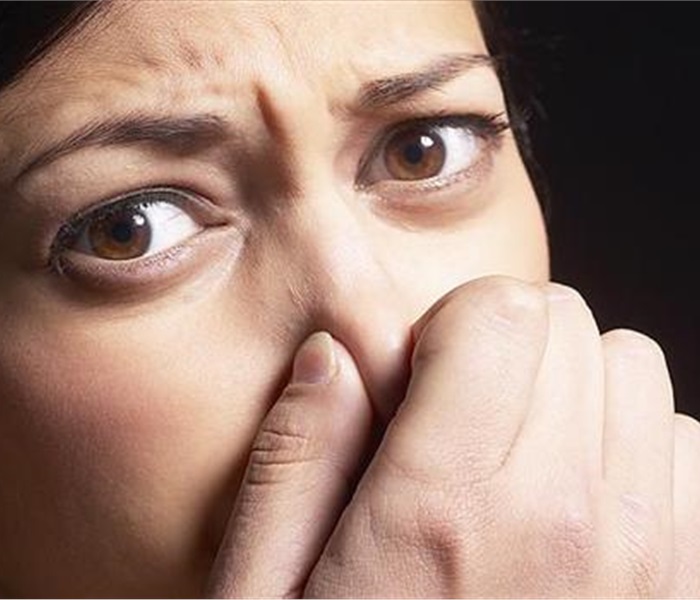
As various materials burn, the smoke produced travels throughout the structure, leaving odorous residues and deposits on surfaces and in hard to reach places. Unless fast, professional action is taken, these residues and deposits can cause permanent damage to contents and may result in periodically resurfacing odors.
From top to bottom...
Servpro of Virginia Beach provides specialized services that rid your home or business of offensive odors left by fire or smoke damage. Any restorable item in affected areas will be professionally cleaned and deodorized, including: furniture, draperies and upholstery, electronics, art, flooring, walls, ceilings, HVAC air ducts and more.
Search and Destroy
SERVPRO of Virginia Beach professionals do NOT cover up lingering odors with a fragrance, they seek out and remove the sources of the odor. Ask us to explain the various deodorization methods available and which will work best for you.
If you or a customer suffer a fire damage -- or some other accident -- and require deodorization services, contact SERVPRO of Virginia Beach. Whether it's fire, water or mold damage -- or just a stubborn odor that refuses to go away -- we'll help make it "Like it Never Even Happened."
SERVPRO of Virginia Beach
757-431-1400
It's always best to call us directly.
Power hungry?
4/29/2013 (Permalink)
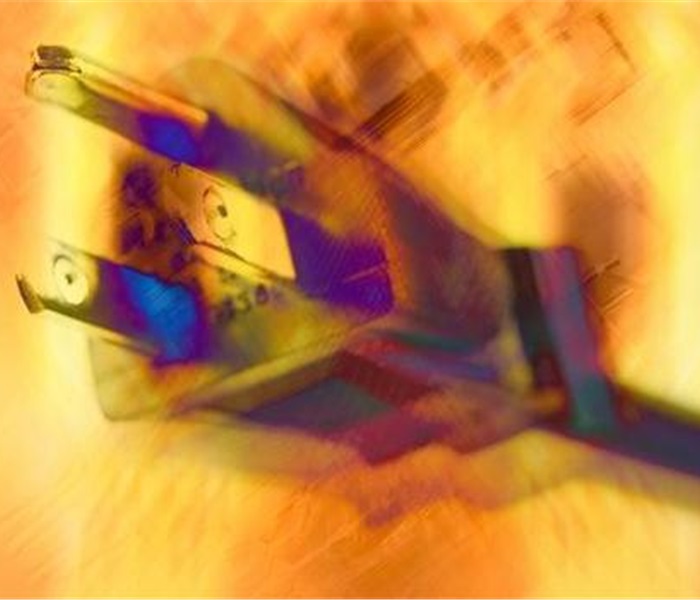
Don't get smoked
A recent report from the U.S. Fire Administration (USFA) shows home electrical fires claim the lives of 280 Americans each year and injure 1,000 more. Many electrical fires in the home or workplace are caused by overloaded circuits and extension cords.
December and January are the peak months for electrical fires. The USFA says fires occur more often in these months due to the increased time spent indoors, which also increases the use of lighting, heating and appliances.
Many electrical fires can be avoided if basic safety precautions are taken. Review the safety tips below to reduce your risk of an electrical fire.
Routinely check your electrical appliances and wiring.
Frayed wires can cause fires.
Replace any electrical tool or appliance if it overheats, shorts out, causes even small electrical shocks or gives off smoke or sparks.
If an appliance has a three-prong plug, use it only in a three slot outlet. Never force it to fit into a two-slot outlet or extension cord.
Following these simple safety rules should help keep your home or business safe from an electrical fire. In the unfortunate event that an electrical fire does happen, call SERVPRO of Virginia Beach and we'll make it "Like it never even happened."
Servpro of Virginia Beach
757-431-1400
It's always best to call us directly.
Know your smoke
4/29/2013 (Permalink)
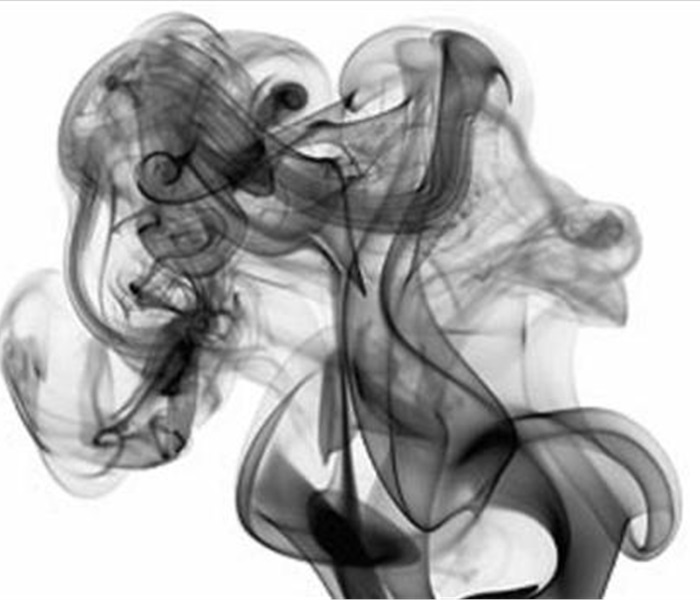
When SERVPRO of Virginia Beach arrives on the scene of a fire, the first step is to calm the customer's fears. The next step is to pre-test the smoke to determine what type of fire has taken place. Knowing the types of smoke and their behavior patterns is crucial to proper cleanup protocol.
Smoke and soot residue can damage carpet, upholstery and contents if not removed quickly and efficiently. In a fire-damaged structure with soot on walls and surfaces, cleaning and restoration is less disruptive and more cost-efficient than replacement. Replacement means a longer disruption time than restoration. For a business waiting to reopen or a family that just wants to come home, this downtime can present a enormous hardship.
Do not leave the first vital hours to anyone who does not understand pre-testing.
The character of smoke
Wet Smoke: generated by the burning of plastics and rubber. Identifiable by it's pungent odor -- the residue is sticky and smears easily.
Dry Smoke: generated by the burning of paper and wood at high temperatures. More residue found at high levels as heat rises.
Protein Smoke: is a product of the evaporation of material during fire, not the fire itself. Although virtually invisible, It discolors paint and varnishes and has an extremely acrid smell.
We know the rules...
Insurance and business professionals understand the rule, "Restore whenever possible, replace only when necessary." SERVPRO of Virginia Beach works hard to ensure pre-testing is completed on every loss to determine restorability. Pre-testing should occur immediately to qualify restoration with the customer by identifying the following:
Items unaffected by the loss
Restorable items
Items that cannot be restored
Questionable items that need an adjuster's professional opinion
Determine the most effective cleaning and restoration processes
Identify pre-existing conditions
Gauge the extent of the loss
Reduce overall costs of the restoration process
Eliminate needless replacements
Judge what is restorable and what must be replaced.
SERVPRO of Virginia Beach
757-431-1400
It's always best to call directly.
Do not fall victim to a dryer fire
4/29/2013 (Permalink)
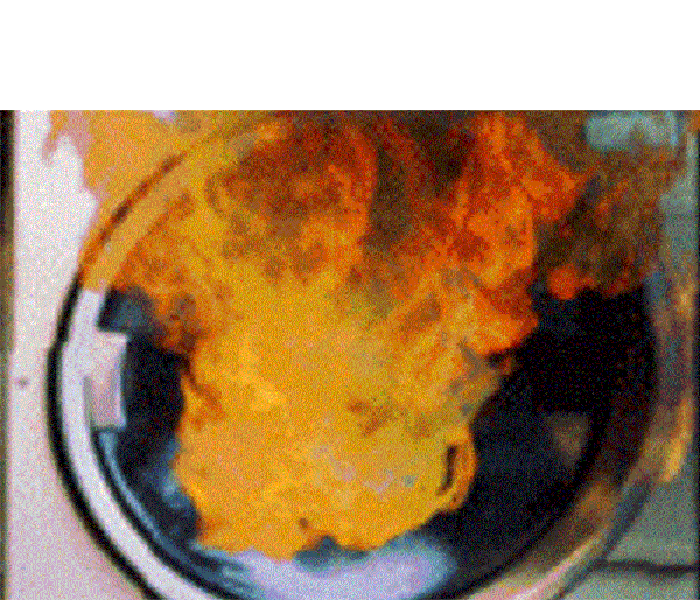
An electric or gas clothes dryer is nearly an essential part of life in most homes. In families with children, the laundry can seem a daunting task, going on forever with washing machines and dryers churning and turning away slowly at a never-ending mountain of laundry.
But, all that convenience carries with it the possibility of a deadly hazard -- a dryer fire -- the leading cause of home fires in this country at the rate of about 15,000 every year.
*Don't dry dangerously*
While today's clothes dryer is in itself a safe piece of machinery and and a feat of modern technology, it isn't fail-safe and requires regular preventive maintenance to prevent fires that could start in your lint trap or anywhere within your dryer's venting.
When lint traps aren't cleaned as often as they should be, the resulting build-up in the screen or other areas can cause the dryer to perform poorly, operate at elevated temperatures and possibly overheat -- with dangerous consequences. Vent systems must also be checked and cleaned to maintain proper air flow for the same reasons.
Problems may also occur if consumers place improper items in their dryers, such as foam backed rugs or athletic shoes, or vent their appliances with plastic or vinyl exhaust materials. Make sure that whatever you put in your dryer is approved and safe to place in a dryer. When in doubt, check the washing instructions on the tag of the clothing or consult the manufacturers website for more information.
Please follow these useful tips to avoid a dryer fire. In the unfortunate event that you encounter a dryer fire and the damage left in its wake, please call us at SERVPRO of Virginia Beach and we can make it Like it Never Even Happened.
757-431-1400
It' s always best to call us directly
How to pick the right fire extinguisher
4/29/2013 (Permalink)
Here's a tip... Choosing the appropriate Fire Extinguisher
Class A:
This is the most common extinguisher and can be used to put out fires in ordinary combustibles such as cloth, wood, rubber, paper and many plastics.
Class B:
Used on fires involving flammable liquids such as grease, gasoline and oil.
Class C:
Designed for fires involving appliances, tools or other equipment electrically energized or plugged in.
Class D:
For use on flammable metals; often specific for the type of metal in question. These are typically found only in factories working with these metals.
Class K:
Intended for use on fires that involve vegetable oils, animal oils or fats in cooking appliances. These extinguishers are generally found in commercial kitchens, but are becoming more popular in the residential market for use in kitchens.
SERVPRO of Virginia Beach is quietly taking to the streets, every hour of every day, proving that whenever there is a house full of water or an office full of smoke, there is a van full of clean! It's always best to call our office directly! 757-431-1400





 24/7 Emergency Service
24/7 Emergency Service






